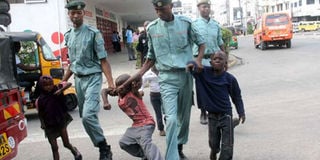Governments have a duty to protect children

Mombasa county askaris round up street children ahead of the festive season, on December 22 , 2015. Plans by the government in 2003 to rid urban areas of street families appear to have crumbled, with devolution creating further confusion on the issue. PHOTO | LABAN WALLOGA | NATION MEDIA GROUP
What you need to know:
- To protect them, Kenya adopted the Convention on the Rights of the Child and the African Charter on the Rights and Welfare of the Child by enacting the Children’s Act in 2001.
- The Children’s Act is clear that no child shall be subjected to discrimination on the grounds of origin, sex, religion, custom, language, colour, and birth, or other status such as social or economic, disability, tribe, residence, or local connection.
- However, one thing is for sure: the action of the Uasin Gishu county government was discriminatory and a violation of the rights of the affected children.
Street children in Uasin Gishu and Mombasa will remember 2015 as the year the two county governments abdicated their constitutional obligations and violated the rights of children.
Children form the largest segment of the vulnerable in any society.
To protect them, Kenya adopted the Convention on the Rights of the Child and the African Charter on the Rights and Welfare of the Child by enacting the Children’s Act in 2001.
The aim is to ensure that parents, guardians, and governments take up their responsibility of caring for and protecting children.
The Children’s Act is clear that no child shall be subjected to discrimination on the grounds of origin, sex, religion, custom, language, colour, and birth, or other status such as social or economic, disability, tribe, residence, or local connection.
Any action taken by a parent, guardian, or government must be in the best interest of the child.
This was certainly not the case in the operation led by the Uasin Gishu deputy governor, Mr Daniel Chemno, that saw hundreds of street children rounded up in Eldoret town and driven back to “their counties of origin”.
According to Mr Chemno, they were taken to Busia, Kakamega, and Bungoma.
This happened around the time that the Uasin Gishu county government was launching a Sh13 million programme to expand rehabilitation centres for street children.
However, what was not announced was that the programme would benefit only street children coming from the county after “outsiders” had been “driven back to their counties of origin”.
DESPICABLE ACTION
Uasin Gishu has been the epicentre of ethnic clashes, especially during elections, as non-indigenous people are flushed out so that they do not influence election results.
How street children, who find themselves homeless as a result of irresponsibility on the part of their parents or governments, or because of poverty, became victims of this situation is difficult to understand.
However, one thing is for sure: the action of the Uasin Gishu county government was discriminatory and a violation of the rights of the affected children.
In Mombasa, images of street children resisting arrest on December 22 was a sight only reminiscent of the Moi era when street children were rounded up whenever a head of State or such dignitary was visiting the country, only for the street families to be let loose after the visitor leaves.
The reason given by the Mombasa county law enforcers for the arrest of more than 150 street families, most of them children, was “to fight insecurity, especially during this festive season”.
Mombasa, which has suffered several terrorist attacks, should develop a partnership with the national government to rehabilitate the homeless.
REHABILITATING STREET CHILDREN
This should be a long-term programme that ensures that the children are rescued, rehabilitated, and reintegrated with their families before they are exposed to radicalisation by terrorists.
Chapter 11 of the Constitution is the basis for the establishment of county governments.
Article 174 provides for the objects of devolution as: to foster national unity by recognising diversity, and to protect and promote the interests and rights of minorities and marginalised groups and communities.
If counties are allowed to continue discriminating against street children, then the objectives of devolution will not be achieved.





